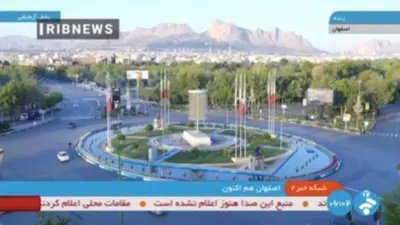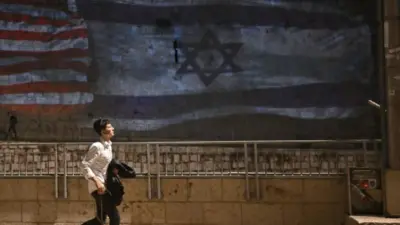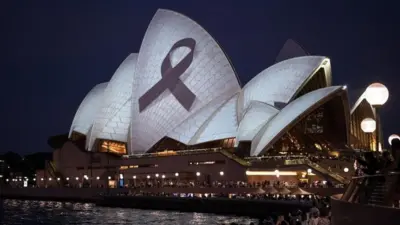We've updated our Privacy and Cookies Policy
We've made some important changes to our Privacy and Cookies Policy and we want you to know what this means for you and your data.
Sudan on the brink amid scramble for democracy
- By Magdi Abdelhadi
- Africa analyst
Image source, AFP
If there is such a thing as "too much democracy", it might help us understand the political drama that has unfolded in Sudan since the overthrow of former President Omar al-Bashir in 2019.
With so many groups wanting a voice in the country's future, the search for consensus is again proving dangerously elusive.
Bashir was toppled by the military - but only after weeks of mass protests. Back then, a loose coalition of groups - the Forces for Freedom and Change (FFC) - came to represent the protesters, united by one goal: "Yasgut Bass".
This is the Sudanese version of the Arab Spring slogan: "The people want the downfall of the regime." Crucially, the word "bass", Arabic for "only", underlined the limits of their consensus - they only wanted to bring down the regime led by Bashir for nearly three decades.
As the events of the past two years have demonstrated, there was little consensus on how to move forward after that.
A power-sharing deal between the military and the FFC was agreed, launching the Sovereign Council which is set to rule the country for another year - with the aim of holding elections and transitioning to civilian rule.
But simmering tension within the FFC boiled over when a breakaway faction launched a new political manifesto at a recent conference to reconfirm the original goals of the uprising but also calling for greater participation of political parties in the decision-making process of the interim government.
Image source, AFP
It is estimated that there are between 80 and 100 political parties in Sudan - and instead of its intention of healing divisions, the conference revealed the growing divisions between the erstwhile allies.
Moreover, there are other civilian political groups opposed to the power-sharing agreement. Not to mention the old ruling party - the National Congress - whose cadres are widely believed to remain entrenched in state institutions, foremost among which are the military and the security services.
'Self-destruction'
Reflecting the sense of a country in crisis, Abdalla Hamdok, the civilian prime minister of the interim government overseeing gradual economic reforms, took to the airwaves last Friday.
Image source, Getty Images
He called for unity and an end to polarisation among the various political parties, which, he said, posed a serious threat to the transition to democracy.
The divisions appear to fit a pattern in modern Sudanese history identified by writer and historian Richard Cockett.
In his book Sudan: The Failure and Division of an African State, he wrote about a fundamental flaw of the country's political class since independence in 1956 - that "spirited political competition came at a price - the self-destruction of democracy".
In other words, the tendency to fragment and splinter has been the Achilles heel of Sudan's politics. Time and again failure to compromise and build consensus paved the way for the military to step in, to mount coups under the pretext of rescuing the country from the chaos inflicted upon it by politicians.
Alarmingly, Mr Hamdok, who survived an assassination attempt 19 months ago, noted that the divisions were not just within the civilian camp, but also within the military.
Signs of that have been on display over the past few months, leading up to the demonstrations that began on Saturday calling on the military to sack the civilian administration and assume responsibility for the transition.
There is a widespread belief that as the date to hand over the chairmanship of the Sovereignty Council to a civilian leader approaches, the military is trying to find a pretext or create new conditions on the ground to justify wriggling out of this commitment.
Hence, the suspicion that its fingers are behind much of the recent turmoil - an attempted coup, a blockade of the main port in the east - with cartoonists having a field day suggesting the revolution is about to be stolen.
This article contains content provided by Twitter. We ask for your permission before anything is loaded, as they may be using cookies and other technologies. You may want to read Twitter cookie policy and privacy policy before accepting. To view this content choose 'accept and continue'.
End of Twitter content, 1
Key figures from the military have repeatedly made their criticism of the civilian politicians public, while maintaining that they are not interested in power themselves - only wanting stability and prosperity for Sudan. That is what the military always says.
Bussed in protesters
Foremost among them is the voice of the controversial deputy of the Sovereign Council, Mohamed Hamdan "Hemeti" Dagolo.
He rose to prominence as the leader of the notorious Janjaweed militia accused of abuses during the conflict in Darfur in 2003. His troops have now been renamed as the Rapid Support Forces (RSF), and their relationship to the regular army forces remain in dispute.
Image source, Getty Images
Last week, Facebook deactivated more than 700 accounts linked to the RSF suspected of manipulating news about Sudan.
Addressing a gathering recently, Hemeti said that politicians only cared about the "chairs" or positions of power - but that soldiers like him cared more about the people and the nation as a whole.
Ominously he added that while politicians could threaten street protests, the military had its "own street".
Right on cue, pro-army demonstrators were bussed into the capital, Khartoum, last week. They called for a new government and asked the army to take charge of the transitional period.
Image source, EPA
But the picture is complex. Not all those who demonstrated on Saturday are supporters of military rule.
There are also those who are unhappy with what they say is a clique from the original FFC that has excluded other groups from being part of the transition process. This has fuelled speculation that it is all a scramble for positions and self-interest.
Some believe that the military is taking a leaf from the book of their Egyptian counterparts, when they used genuine popular discontent with the course of the revolution back in 2013 to take back control of the country and thwart the democratic transition.
More demonstrations are planned later this week. This time by groups opposed to the military and their supporters, who had set up camp outside the Republican Palace. The scene is set for serious confrontation, which could spiral out of control.
The 2019 power-sharing agreement that was hailed as unprecedented and saved the country from the risk of protracted conflict is coming under growing pressure from all sides - the military and rival political parties.
Commenting on the impasse, regional expert Alex de Waal recently said that it was naïve to believe that Sudan - which has never managed to agree on a common vision for its identity or political system in the last 60 years - would achieve some kind of national unity soon.
The best one could hope for now, he suggested, was that the Sudanese agreed to disagree in words not action - and continued talks to avoid violence.
More on post-Bashir Sudan:
Top Stories
Features & Analysis
Most read
Content is not available








